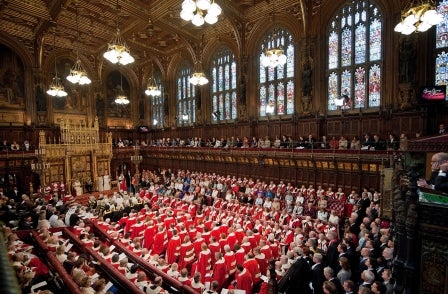
The Government has been urged by a former cabinet minister to stand firm behind the Parliament-backed draft Royal Charter on press regulation.
Tory Lord Jenkin of Roding, an environment secretary in the 1980s, said the press had become an "over-mighty subject" and compared the industry to aristocrats in the 18th century and trade unions in the 20th century.
The Government has delayed its presentation to the Privy Council of the proposed Royal Charter, which would underpin a new system of press regulation, to give move time for consideration of an alternative charter put forward by the industry.
Lord Jenkin said: "I hope the Government are going to stand very firm with their Royal Charter on press regulation which was agreed at the end of the session by the three main parties represented in Parliament.
"What we are witnessing at the moment is some newspaper groups seeking to substitute their own much weaker charter."
In debate on the Queen's Speech, he told peers: "It is no less than a really very blatant attempt by those newspapers and their proprietors to keep their status in society as an over-mighty subject.
"Previous governments have had to deal with over-mighty subjects. They had to face down the aristocracy in the 18th century, they had to face the Tory mill owners and factory owners in the 19th century and they had to face the trade unions in the 20th century.
"The Leveson inquiry exposed the press as the over mighty subject of the 21st century, believing, like its predecessors, to be above the law and outwith the surveillance of Parliament. That can be acceptable to no democratic government.
"Some newspaper owners may dislike intensely the prospect of tougher regulation, but the way they are fighting their case does not make a pretty sight and I very much condemn them."
Former deputy prime minister Lord Prescott, a victim of phone hacking, also called for an end to the delay in implementing a new system of press regulation.
The Labour peer said newspapers wanted regulation "to remain as it is".
"My concern is the actions of the press themselves," he said. "They are still showing their bitter opposition."
He said that if the press refused to accept the proposed Royal Charter agreed with cross-party support, Parliament had to face up to its "obligations".
"Our obligation is to carry out what Parliament decided," he said. "That means the only alternative is a statutory piece of legislation and we should be very clear about that.
"To give in again is exactly what we have always done on press regulation – give in, give in, give in.
"And as we get near the election prime ministers get nervous about what papers are going to do.
"Don't let them do the same thing. Now is the time for change, now is the time to pass what Parliament has said and say to the media 'like every organisation in this country you have some responsibility for a regulated framework'."
Email pged@pressgazette.co.uk to point out mistakes, provide story tips or send in a letter for publication on our "Letters Page" blog
